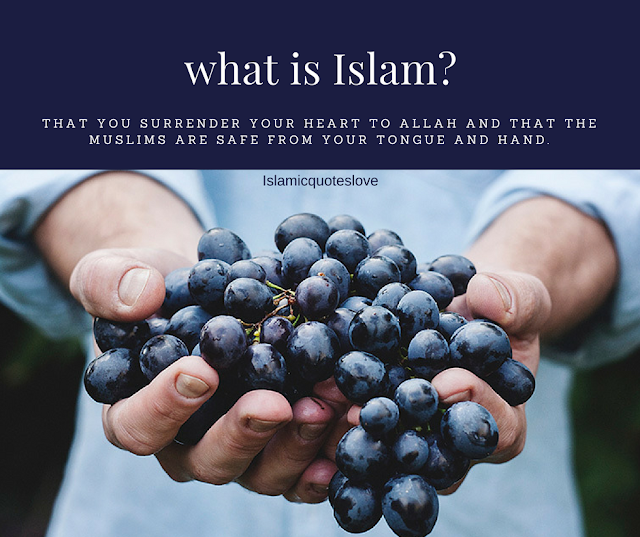The Prophet defined the true Muslim as one who avoids harming other Muslims with his tongue (words) and hand (actions).
Abdullah bin Amr reported: The Messenger of Allah, peace and blessings be upon him, said:
الْمُسْلِمُ مَنْ سَلِمَ الْمُسْلِمُونَ مِنْ لِسَانِهِ وَيَدِهِ
The Muslim is the one from whose tongue and hand the Muslims are safe.
Source: Ṣaḥīḥ al-Bukhārī 10, Grade: Muttafaqun Alayhi
Amr ibn Absah reported: A man said, “O Messenger of Allah, what is Islam?” The Messenger of Allah, peace and blessings be upon him, said:
أَنْ تُسْلِمُ قَلْبَكَ لِلَّهِ وَيَسْلُمُ الْمُسْلِمُونَ مِنْ لِسَانِكَ وَيَدِكَ
That you surrender your heart to Allah and that the Muslims are safe from your tongue and hand.
Source: Shu’ab al-Imān 20, Grade: Sahih
We should be particularly careful to protect those within our own community, but the principle is not restricted only to Muslims. Rather, it applies to all humanity and even the animals.
In another narration of this tradition, the Prophet said:
الْمُسْلِمُ مَنْ سَلِمَ النَّاسُ مِنْ لِسَانِهِ وَيَدِهِ وَالْمُؤْمِنُ مَنْ أَمِنَهُ النَّاسُ عَلَى دِمَائِهِمْ وَأَمْوَالِهِمْ
The Muslim is the one from whose tongue and hand the people are safe, and the believer is the one who is trusted with the lives and wealth of the people.
Source: Sunan al-Nasā’ī 4998, Grade: Sahih
And in another narration, the Prophet said:
الإسلام أفضل مَنْ سَلِمَ النَّاسُ مِنْ لِسَانِهِ وَيَدِهِ
The best Islam belongs to those from whose tongue and hand people are safe.
Source: Musnad Aḥmad 6714, Grade: Sahih
Hasan Al-Basri, may Allah have mercy on him, said:
إِنْ سَرَّكُمْ أَنْ تَسْلَمُوا وَيَسْلَمَ لَكُمْ دِينُكُمْ فَكُفُّوا أَيْدِيَكُمْ عَنْ دِمَاءِ النَّاسِ وَكُفُّوا أَلْسِنَتَكُمْ عَنْ أَعْرَاضِهِمْ وَكُفُّوا بُطُونَكُمْ عَنْ أَمْوَالِهِمْ
If you would be pleased to be safe and for your religion to be safe for you, then restrain your hands from harming the lives of people, restrain your tongues from harming their honor, and restrain your stomachs from consuming their wealth.
Source: Makārim al-Akhlāq lil-Kharā’iṭī 379
It is not permissible in Islam to harm even a small animal like a bird, a dog, or even pig without a just cause for doing so.
Abdullah ibn Umar reported: The Messenger of Allah, peace and blessings be upon him, said:
مَنْ قَتَلَ عُصْفُورًا فَمَا فَوْقَهَا بِغَيْرِ حَقِّهَا سَأَلَ اللَّهُ عَزَّ وَجَلَّ عَنْهَا يَوْمَ الْقِيَامَةِ
If someone kills so much as a sparrow or anything larger without a just cause, then Allah the Exalted will ask him about it on the Day of Resurrection.
Source: Sunan al-Nasā’ī 4445, Grade: Sahih
In another narration, the Prophet said:
مَنْ قَتَلَ عُصْفُورًا عَبَثًا عَجَّ إِلَى اللَّهِ عَزَّ وَجَلَّ يَوْمَ الْقِيَامَةِ يَقُولُ يَا رَبِّ إِنَّ فُلَانًا قَتَلَنِي عَبَثًا وَلَمْ يَقْتُلْنِي لِمَنْفَعَةٍ
Whoever kills so much as a sparrow unjustly will have it pleading to Allah on the Day of Resurrection, saying: O Lord, he killed me for no reason, and he did not kill be for any beneficial purpose.
Source: Sunan al-Nasā’ī 4446, Grade: Hasan
Fudayl ibn Iyad, may Allah be pleased with him, said:
وَاللَّهِ مَا يَحِلُّ لَكَ أَنْ تُؤْذِيَ كَلْبًا وَلَا خِنْزِيرًا بِغَيْرِ حَقٍّ فَكَيْفَ تُؤْذِي مُسْلِمًا
By Allah, it is not lawful for you to harm a dog or a pig without a just cause, so how can you harm a Muslim?
Source: Siyar Aʻlām al-Nubalāʼ 8/427
Indeed, a true Muslim must not harm his neighbors at all, whether they are Muslims or non-Muslims, lest he be forbidden from entering Paradise.
Abu Huraira reported: The Messenger of Allah, peace and blessings be upon him, said:
مَنْ كَانَ يُؤْمِنُ بِاللَّهِ وَالْيَوْمِ الْآخِرِ فَلَا يُؤْذِي جَارَهُ
Whoever believes in Allah and the Last Day, let him not harm his neighbor.
Source: Ṣaḥīḥ al-Bukhārī 6110, Grade: Muttafaqun Alayhi
In another narration, the Prophet said:
لَا يَدْخُلُ الْجَنَّةَ مَنْ لَا يَأْمَنُ جَارُهُ بَوَائِقَهُ
He will not enter Paradise whose neighbor is not secure from his evil.
Source: Ṣaḥīḥ Muslim 46, Grade: Sahih
And in another narration, the Prophet said:
أَلَا أُخْبِرُكُمْ بِخَيْرِكُمْ مِنْ شَرِّكُمْ خَيْرُكُمْ مَنْ يُرْجَى خَيْرُهُ وَيُؤْمَنُ شَرُّهُ وَشَرُّكُمْ مَنْ لَا يُرْجَى خَيْرُهُ وَلَا يُؤْمَنُ شَرُّهُ
Shall I not tell you what distinguishes the best of you from the worst of you? The best of you are those from whom goodness is expected and people are safe from their evil. The worst of you are those from whom goodness is not expected and people are not safe from their evil.
Source: Sunan al-Tirmidhī 2263, Grade: Sahih









![Alhamdulilah 10 Blessed Days of Dhul Hijjah are almost here...Lets spend this days by doing lots of Worship,Dua & by Fasting..If you have missed the Ramadan, if you have missed salah whole year, if you sinned whole year..so this the time to Repent, This is the Time to be more closer to Allah, So don't waste this days, Who knows you may not get this days next year... Abdullah Ibn Abbas Radiallho anhoma relates that Rasolullah Sallaho alahi wassallam said: "Goods deeds performed on other days are not superior to those performed on these (first 10 days of Dhul Hijjah)" The Sahaba Radiallho anhom inquired, "Not even Jihand?" He Sallaho alahi wassallam replied, "Not even jihad, except for that person who goes out puttng himself and his wealth in danger and does not return with anything.". [Bukhari] Abu Hurairah Radiallaho anho relates that Rasolullah Sallaho alahi wassallam said, "On no days is the worship of Allah desired more than in the (first) 10 days of Dhul Hijjah. The fast of each of these days is equal to the fast of the whole year, and the worship of each of these nights is equal to the worship ofLaylatul Qadr." [Tirmidhi, Ibn Majah] Abdullah Ibn Umar Radiallho anhoma relates that Rasolullah Sallaho alahi wassallam said, "No days are as weighty with Allah and so liked by Him for good deeds than the first 10 days of Dhul Hijjah. So on these days, increasingly read SUBHAN ALLAH, LA ILAHA ILLALLAH, ALHAMDULILLAH and ALLAHU AKBAR." [Ahmad] Please make dua for all the people who are going to Hajj, May Allah accept their Hajj..Pray for Whole Ummah....Pray for the Peace all over the world,. May Allah accept all our prayers & Dua's...May Allah bless our family.. . Ameen](https://blogger.googleusercontent.com/img/b/R29vZ2xl/AVvXsEhVgKUcPI81AmfD2aEjo4QULBXPOajxa-3ii0Nfh4gJGSVOLKI2w1yxYU11MKBLNRmTPb3cUye7iciiDOGFXFc3qLPcTTCT2vofLZt7jdJLOE9SJ50_0yztWpzJztiTt6sMwaPKr8PrFUs/s640/Dhul+hajj.png)
![Time for Salaah! My respectable brothers and sisters in Islam, Asr prayer is fast approaching, so let get ourselves prepare with joy, cleanliness and humility to prostrate ourselves for Almighty Allah. In Islam, after performing the obligatory deeds, one of the best ways of drawing closer to Allah is by performing voluntary good deeds. So therefore (before) performing Asr prayer, one can perform 4 sunnah rakats (seperately). However, this does not add up to the 12 main Sunnah prayers (which in arabic is called Rawatib) as the Prophet (pbuh) mentioned in a hadith, "Whoever prays optionally twelve rakats every one day and night, Allah will reward him by an established dwelling in the paradise" (Rep by Bukhari). So one can leave the Sunnah prayers of Asr or prays it if one wants more rewards. But (after) Asr (there is definitely no) Sunnah Prayer to be performed for Asr. Narrated Ibn `Umar: Allah's Messenger (ﷺ) said, "Whoever misses the `Asr prayer (intentionally) then it is as if he lost his family and property." ●[Sahih al-Bukhari ] May Allah help us to perform our Salaah well and on time.](https://blogger.googleusercontent.com/img/b/R29vZ2xl/AVvXsEg14R5IM9k-vWrsRStHtp_LTxyhPBdvSEteLpkZWVbejWPcVm5KU_vyx3jbgI_Tb-C3320hHYY6U5bhaakdhNUvMXnOOOTs6MkowcWpV-7TXF3vA1tiOuq-cQVT1oEf-jipgmbBvE_bQQ/s640/time+to.png)


![Prophetic Supplications for Trials La ilaha ila anta subhanaka ini kuntu mina zalimeen. -Quran [17:87] Prophetic Supplications for Trials The Prophet (peace and blessings be upon him) said, “The supplication of my brother Dhun Nun (Yunus, peace be upon him), who called on Allah while in the whale’s belly: ‘There is no deity but You. Glory be to You! Verily, I have been among the wrongdoers’ (Quran 21:87) – no Muslim person says it, for any situation whatsoever, except that Allah Most High answers his call.” [Tirmidhi] La ilaha illa Anta, Subhanaka, inni kuntu mina z-zalimin. لا إلهَ إلا أنتَ سُبْحَانَكَ إِنِّي كُنْتُ مِنَ الظّالِمِيْنَ 2- “O Allah! There is no ease except that which You make easy, and indeed You, when You want, make difficulties easy.” [Sahih Ibn Hibban] Allahumma la sahla illa maa ja’altahu sahlan, wa Anta taj’alu l-hazna idha shi’ta sahla. اللّهُمَّ لا سَهْلَ إلا ما جَعَلْتَهُ سَهْلا وَأنتَ تَجْعَلُ الحَزْنَ إذا شِئْتَ سَهْلا 3- The Prophet (peace and blessings be upon him) would say when in distress, “There is no deity but Allah, the Knowing, the Clement. There is no deity but Allah, Lord of the Magnificent Throne. There is no deity but Allah, Lord of the heavens and Lord of the earth and Lord of the Noble Throne.” [Sahih Bukhari]La ilaha illa Allahu l-Alimu l-Halim. La ilaha illa Allahu Rabbu l-Arshi l-Azim. La ilaha illa Allahu Rabbu s-samawati wa Rabbu l-ardi wa Rabbu l-Arshi l-Karim. لا إلهَ إلا اللهُ العَليمُ الحَليم لا إلهَ إلا اللهُ ربُّ العَرْشِ العَظِيْم لا إلهَ إلا اللهُ ربُّ السَّمَاوَاتِ وَرَبُّ الأَرْضِ ربُّ العَرْشِ الكَرِيْم 4- When the Prophet (peace and blessings be upon him) would be afflicted with a stressful trial, he would say, “O Living and Eternal Maintainer! By Your mercy I seek help!” [Sunan Tirmidhi] Ya Hayyu Ya Qayyum! Bi rahmatika astagheeth! يَا حَيُّ يَا قَيُّوْمُ بِرَحْمَتِكَ أَسْتَغِيْث And Allah knows best. wassalam](https://blogger.googleusercontent.com/img/b/R29vZ2xl/AVvXsEgwp39MqmD-r7nwTaWTCltUWl2FKQMIeYobKvo9rg4fvKWZkpsgk5Fz8aboLqSq78WTv_keNbH6zLmZxTMyJfaa6uvOVQFQ9yKgnQnzRN4M40dI01PaQmJUXBKQdrGi2M-3bw84p0OqMkA/s640/And+call+on+Him%252C+fearing+and+hoping%252C+surely+the+mercy+of+Allah+is+near+to+those+who+do+good.+%252811%2529.png)






